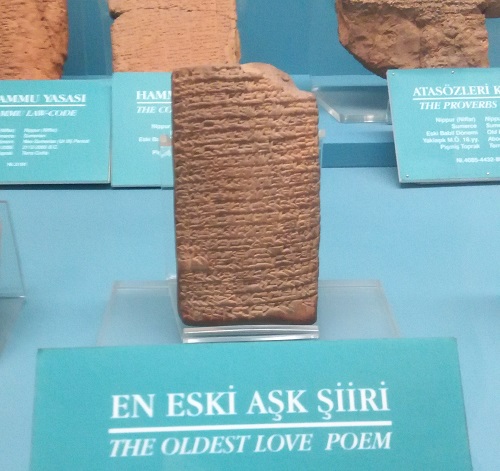The oldest love poem: A missing key to understanding Song of Songs?
The poem of Su-Shin is the oldest love poem ever discovered. Some of its lines sound very reminiscent of the Song of Songs.
25 DECEMBER 2017 · 11:00 CET

The Song of Songs is one the most difficult Biblical text to interpret perhaps second to Revelation.
Throughout the ages, scholars have taken several types of interpretative approaches and many questions still abound. Is this poem to be taken literally? Does this poem poetically express actual events?
Is this poem to be taken allegorically as a symbol of God’s love and desire for his people? Or is this poem simply a celebration of sexuality, God’s gift to mankind?
One of the difficulties in answering these questions is our lack of context. Because of this, it is rather difficult to find an interpretative anchor.
Perhaps if we had a parallel reading or other examples of similar poetry it would be easier to find answers to these questions.
This is precisely where I want to draw attention to the poem of Su-Shin, the oldest love poem ever discovered. Unearthed in the ancient city of Nippur during the last years of the 19th century, this poem remains now as one of the hidden jewels of the Istanbul Archaeological Museum.
The translation of this poem which was written around the 20th century BCE is as follows:
“Bridegroom, dear to my heart,
Goodly is your beauty, honey-sweet,
Lion, dear to my heart,
Goodly is your beauty, honey-sweet.
You have captivated me, let me stand tremblingly before you.
Bridegroom, I would be taken by you to the bedchamber,
You have captivated me, let me stand tremblingly before you.
Lion, I would be taken by you to the bedchamber.
Bridegroom, let me caress you,
My precious caress is more savory than honey,
In the bedchamber, honey-filled,
Let me enjoy your goodly beauty,
Lion, let me caress you,
My precious caress is more savory than honey.
Bridegroom, you have taken your pleasure of me,
Tell my mother, she will give you delicacies,
My father, he will give you gifts.
Your spirit, I know where to cheer your spirit,
Bridegroom, sleep in our house until dawn,
Your heart, I know where to gladden your heart,
Lion, sleep in our house until dawn.
You, because you love me,
Give me pray of your caresses,
My lord god, my lord protector,
My Shu-Sin, who gladdens Enlil's heart,
Give my pray of your caresses.
Your place goodly as honey, pray lay (your) hand on it,
Bring (your) hand over like a gishban-garment,
Cup (your) hand over it like a gishban-sikin-garment.”
As you can observe, some of these lines sound very reminiscent of the Song of Songs.
Compare some of the honey imagery for example: "Your lips, my bride, drip honey; Honey and milk are under your tongue, And the fragrance of your garments is like the fragrance of Lebanon.” (Song of Solomon 4:11, ESV)
In both poems sexual desires and yearning are clearly expressed, the leading narrator is the female, and both celebrate the pleasures of sexual union.
So what is this Sumerian poem all about? Su-Shin was the king of the City-state of Ur and reigned during the 20th or 21st century BCE.
At the beginning of every calendar year (the king of the city of Ur would enter a sexual union with the high priestess of Inanna, the goddess of love and fertility.
What this sexual union was meant to achieve was blessing and prosperity for the forthcoming year. As part of this sexual rite, a poem would be written down and be read in banquets as part of the new year festivities.
Even though the poem was certainly about the physical act of the sexual union itself, it was also reflective of the covenant or contractual relationship entered between the king and Inanna.
As far as who the king represented in this ritual is a matter of debate. One explanation is that the king simply is representing the people, another possible explanation is that the king represented Dumuzi, Inanna’s shepherd lover, who was deified as a result of his sexual union her.
It is possible, therefore, that the religious rite was a reenactment of the Inanna and Dumuzi myth.Some scholars would like to argue for the dependence of the Song of Songs on poems of this kind. Due to the 1000 year gap, this seems quite unlikely
What is more likely is that the Biblical author may have been influenced by this literary style or perhaps had this literary style in mind when writing the Song of Songs.
One should not be surprised by this. Mesopotamian love poetry would have been taught during the first millennium BCE, especially among the more well-to-do, much like we learn Shakespeare’s sonnets nowadays in school.
So if this is the literary style which the author of Song of Songs follows, how are we to read this poem? As a celebration of sexuality? As a poem of an actual sexual encounter between a man and a woman?
As symbolic of the love relationship between Yahweh and his people? As a religious text with theological messages? My suggestion is that, perhaps, its all of the above!
Marc Madrigal is a member of the Istanbul Protestant Church Foundation in Turkey.
BIBLIOGRAPHY
Clyde E. Fant; Mitchell G. Reddish. Lost Treasures of the Bible: Understanding the Bible through Archaeological Artifacts in World Museums. William B. Eerdmans Publishing Company. Grand Rapids, Michigan. 2008.
Mark, Joshua J. The World's Oldest Love Poem. Ancient History Encyclopedia.
Pasinli, Alpay. “Istanbul Archaeological Museums.” A Turizim Yayinlar. Istanbul, 2012.
Published in: Evangelical Focus - Archaeological Perspectives - The oldest love poem: A missing key to understanding Song of Songs?
